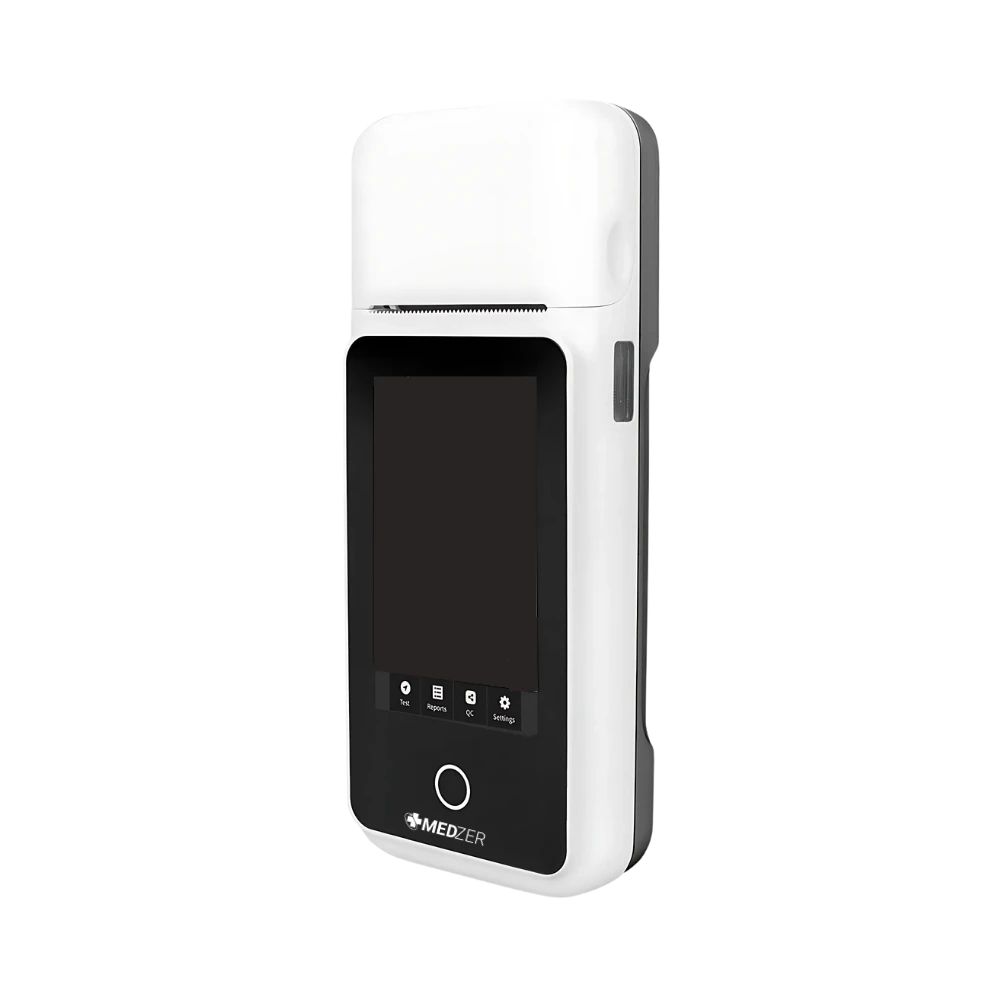
Portable Electrolyte Analyzer PEA-1000A provides an accurate analysis system with only 100 µl of blood or serum for rapid diagnostic tests. It provides reliable results in 4 minutes per sample via ion-selective electrode technology. Built in internal calibration system ensures long-term accuracy without recalibration by hand. Incorporated with user-friendly display and thermal printer for easy operation. Our Portable Electrolyte Analyzer is ideal for critical testing in dialysis centres, emergency rooms, intensive care units, and clinical laboratories.
Qty:
Specifications
| Test Time | 4 Minutes per Sample |
|---|---|
| Sample Volume | 100 µl |
| Sample Type | Venous Whole Blood, Serum |
| Parameters Measured | K⁺, Na⁺, Cl⁻, Ca²⁺, pH, Li⁺, tCO₂ |
| Test Principle | Ion Selective Electrode (ISE) |
| Calibration | Internal Calibration |
| Storage Capacity | Up to 500,000 Results |
| Connectivity | WiFi, HL7 LIS Interface |
| Scanner | Internal Scanner for Sample and Cartridge |
| Interface | USB Type-C |
| Display | 4.3 - inch Color Display |
| Printer | Built-in Thermal Printer |
| Battery | 3.7V, 5000 mAh; up to 55 Tests in Succession |
| Net Weight | 0.9 kg |
Features
Simplified 3-step testing process
Maintenance-free operation
Electrode-free analytical chamber
LED interface with soft-touch keys
Supports capillary and whole blood input
Optional Accessories
5 Blood Gas Electrolyte items (BE5)
Complex Control for BE5
Applications
Portable Electrolyte Analyzer PEA-1000A is applied in rapid and accurate electrolyte testing in emergency care, dialysis monitoring, and critical diagnostics across ICUs, outpatient clinics, and clinical laboratories.
The Portable Electrolyte Analyzer PEA-1000A can analyze venous whole blood and serum samples. It needs only 100?µl of sample volume per test, being highly minimally invasive.
The Portable Electrolyte Analyzer PEA-1000A provides accurate results within a mere 4 minutes per sample. This makes it extremely well-suited for emergency and critical care testing applications.
It analyzes significant electrolyte and blood gas parameters such as K?, Na?, Cl?, Ca²?, pH, Li?, and tCO?. This extensive range provides complete diagnostic capability in a single test run.
No, the Portable Electrolyte Analyzer PEA-1000A has an internal calibration system. This does away with the need for repeated manual recalibration but ensures long-term accuracy.
The analyzer has WiFi and HL7 LIS interface for seamless integration with lab systems. It also features a USB Type-C port and internal scanner for data and sample management.
It provides remarkable internal data storage capacity of up to 500,000 results. This allows for efficient long-term data management without reliance on external systems.
The Portable Electrolyte Analyzer PEA-1000A is suitable for dialysis centers, emergency rooms, ICUs, and outpatient clinics. Its portability and rapid turnaround make it well-suited for point-of-care diagnostics.
A Portable Electrolyte Analyzer is used to measure electrolyte levels like sodium, potassium, and chloride in blood or serum. It offers quick, on-site diagnosis for field testing, emergency care, and mobile labs.
It employs ion-selective electrode (ISE) technology to measure and detect electrolytes in a blood sample. The results are displayed quickly and is extremely accurate for point-of-care clinical decision-making.
Most of the portable analyzers accommodate whole blood, serum, or plasma samples. They need a small volume of sample, most often 100 ?l or less.
Yes, these analyzers are made for simplicity of use at home visits, mobile clinics, and field settings. Their portability and automatic operation make them well suited for non-laboratory use.
Current portable analyzers provide laboratory-like accuracy with the utilization of sophisticated ISE sensors. Internal quality controls and real-time calibration enhance measurement integrity.
They usually have automatic or operator-initiated calibration cycles. Most models are designed for low-manual calibration, with consistent results and minimal downtime.
2025 © All Rights Reserved by Medzer.com